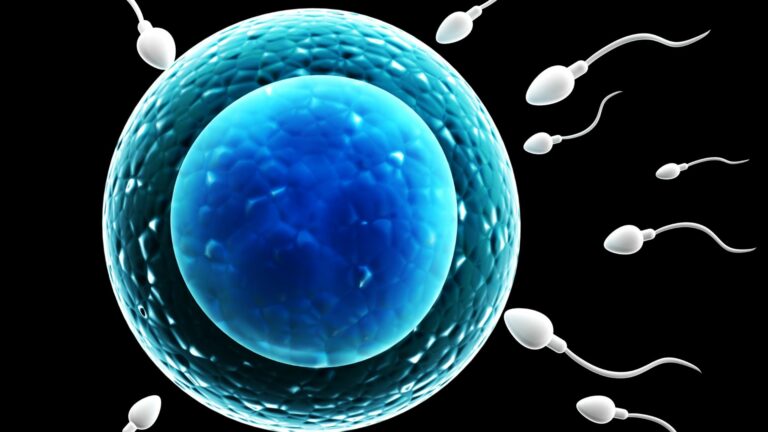
| Factor | IVF (In Vitro Fertilization) | IUI (Intrauterine Insemination) |
|---|---|---|
| Procedure | Eggs are fertilized by sperm in a lab, then embryos are transferred to the uterus | Concentrated sperm is placed directly into the uterus |
| Invasiveness | More invasive, involving egg retrieval and embryo transfer | Less invasive, no egg retrieval required |
| Medication | Requires hormone injections to stimulate egg production | May involve oral or injectable ovulation stimulation drugs |
| Cost | More expensive, typically ₹1,35,000 to ₹2,50,000 per cycle | Less expensive, typically ₹10,000 to ₹20,000 per cycle |
| Success Rates | Higher success rates, 30-35% per cycle on average | Lower success rates, 10-20% per cycle on average |
| Best For | Complex infertility cases, such as blocked fallopian tubes, severe male factor infertility, or advanced maternal age | Mild male factor infertility, cervical mucus issues, unexplained infertility, or ovulation problems |
| Time to Pregnancy | May achieve pregnancy faster due to higher success rates per cycle | May require multiple cycles to achieve pregnancy |
| Multiple Pregnancy Risk | Higher risk of multiple pregnancy if more than one embryo is transferred | Lower risk of multiple pregnancy, but still possible if ovulation stimulation drugs are used |
Trying to conceive can be an exciting time, but it can also be stressful, especially if you’ve been trying for a while without success.
If you’re exploring fertility treatments in India, you might have come across two terms: In Vitro Fertilization (IVF) and Intrauterine Insemination (IUI). Both are fertility treatments, but they work in very different ways.
This comprehensive guide will explain what IVF and IUI are, how they differ, and which one might be right for you on your journey to parenthood.
We’ll cover:
- What is IVF?
- The IVF process and procedure
- Why and when to consider IVF
- What is IUI?
- How IVF and IUI differ
- Success rates of IVF vs IUI
- Cost considerations
- Which treatment option may be right for you
- Questions to ask your doctor
We know that making decisions about fertility treatment can be overwhelming. There are many factors to consider, and it’s important to have a clear understanding of your options.
This guide is designed to empower you with knowledge as you move forward on this path.
A Note on Credibility and Expertise
The information in this blog post is intended for general educational purposes only and is not a substitute for professional medical advice.
Always consult with a qualified fertility specialist in India familiar with the latest guidelines and practices set forth by the Indian Council of Medical Research (ICMR).
Now that we’ve covered the essential ground rules, let’s delve into the world of IVF and IUI!
What is IVF?
In Vitro Fertilization (IVF) is a complex fertility treatment that involves several steps:
- Ovulation Stimulation: You’ll take medication to stimulate your ovaries to produce multiple eggs. Learn more about the IVF medications used in India.
- Egg Retrieval: A minor surgical procedure is performed to retrieve the mature eggs from your ovaries.
- Fertilization: In a specialized lab, the retrieved eggs are mixed with your partner’s sperm (or donor sperm). The goal is to achieve fertilization, where a sperm successfully enters an egg.
- Embryo Development: The fertilized eggs (now embryos) are monitored for several days. Advanced techniques like time-lapse imaging may be used.
- Embryo Transfer: The healthiest embryo (or embryos) is carefully transferred to your uterus using a thin catheter. The hope is that implantation will occur, leading to pregnancy.
IVF is a intricate process with many moving parts. For a deeper dive, read our detailed overview of what to expect with IVF.
When is IVF Considered?
IVF can be a successful option for a wide range of infertility issues, including:
- Blocked or damaged fallopian tubes
- Severe male factor infertility (low sperm count, poor sperm motility)
- Endometriosis
- Unexplained infertility
- Advanced maternal age
- Genetic disorders
To learn more about the indications for IVF, read our article on why and when to consider IVF.
What is IUI?
Intrauterine Insemination (IUI) is a less invasive fertility procedure as compared to IVF.
Here’s how it works:
- Ovulation Monitoring: You may take medication to stimulate ovulation, and your doctor will track your cycle to identify the optimal time for insemination.
- Sperm Preparation: Your partner’s sperm (or donor sperm) is collected and “washed” in a lab. This process concentrates the healthiest, most active sperm.
- Insemination: During your ovulation window, the prepared sperm is inserted directly into your uterus using a thin, flexible catheter.
When is IUI Considered?
IUI may be recommended for:
- Mild male factor infertility
- Cervical mucus issues
- Unexplained infertility
- Ovulation problems (sometimes used in combination with ovulation medication)
If you’re wondering whether IUI might be right for you, discuss your specific situation with your fertility doctor. They can provide personalized guidance based on your diagnosis and medical history.
How Do IVF and IUI Differ?
IVF and IUI are both effective fertility treatments, but they have key differences in their procedures, success rates, and who they might be the best option for. Understanding these differences is crucial in making an informed decision.
Key Differences
| Feature | IVF | IUI |
|---|---|---|
| Procedure | Complex, involving multiple steps, egg retrieval, and lab fertilization | Less invasive, involves placing prepared sperm directly into the uterus |
| Invasiveness | More invasive | Less invasive |
| Medication | Requires hormone stimulation to produce multiple eggs | May or may not involve ovulation-inducing medication |
| Success Rates | Generally higher success rates, especially for complex infertility cases | Success rates are lower compared to IVF |
| Cost | More expensive | Less expensive |
Table Summary
This table offers a quick at-a-glance comparison of IVF and IUI. For a more nuanced understanding, let’s explore each aspect further.
Choosing the Right Option
Deciding between IVF and IUI depends on your individual diagnosis, medical history, age, and financial considerations.
Your fertility specialist in India is the best person to guide you based on your specific circumstances.
Always discuss the risks, potential side effects, and expected outcomes with your doctor before starting any treatment.
Some key factors to consider:
- Cause of Infertility: IVF may be recommended for more complex issues like blocked fallopian tubes or severe male factor infertility, while IUI can be effective for milder problems.
- Age: As women age, especially past 35, IVF often becomes the preferred option due to higher success rates.
- Number of Cycles: Multiple IUI cycles may be recommended before moving on to IVF.
- Financial Resources: The cost difference between IVF and IUI can be substantial, which may influence your decision.
Remember, there’s no one “right” path. The best approach is the one that aligns with your unique situation and goals.
Success Rates: Which is More Likely to Work?
It’s natural to want to know the chances of success with IVF and IUI treatments. Keep in mind that success rates can vary significantly depending on many factors:
- Age: The single most important factor. Fertility naturally declines with age, especially for women.
- Cause of Infertility: Different infertility diagnoses have varying success rates with different treatments.
- Clinic and Lab Quality: The expertise of the clinic and the technology in their lab play a role in outcomes.
- Lifestyle Factors: Smoking, being overweight, or excessive stress can impact success.
General Success Rates in India
- IVF: Average success rates in India typically range between 30-35%, with higher rates possible for younger women using their own eggs.
- IUI: Success rates are generally lower, averaging around 10-20% per cycle.
Important Considerations
- Success rates often refer to live birth rates per cycle or embryo transfer.
- Most couples may need multiple IVF or IUI cycles to achieve pregnancy.
- It’s essential to discuss personalized success rates with your fertility specialist based on your individual situation.
For more insights, read our article on interpreting IVF success rates and how to increase your chances of IVF success.
Cost Considerations
Cost is a significant factor when considering fertility treatments in India. Here’s a general overview:
- IVF: IVF treatment in India can range approximately from ₹1,35,000 to ₹2,50,000 per cycle. Additional costs may include medications, pre-treatment testing, and embryo freezing.
- IUI: IUI is significantly less expensive. The cost per cycle generally ranges from ₹10,000 to ₹20,000.
Financial Considerations
- Inquire about payment plans and financing options available at your clinic, as some clinics may have financial assistance programs or partnerships with lenders.
- Explore if your insurance policy offers coverage for fertility treatments like IVF or IUI.
- Consider doing IVF on a budget and look into employer fertility benefits in India.
The financial aspect of fertility treatments can be daunting, but there are resources and strategies available to make it more manageable. Don’t hesitate to discuss your concerns with your clinic’s financial counselor.
Which One is Right for Me?
There’s no one-size-fits-all answer, as the best fertility treatment depends on several individual considerations. It’s essential to have a thorough consultation with your fertility specialist in India.
Here are some key factors your doctor will discuss with you:
- Your Diagnosis: The specific cause of your infertility will play a big role in determining if IVF or IUI is more likely to be successful.
- Age: Age, especially the woman’s age, impacts potential success rates with both IVF and IUI.
- Previous Treatments: If you’ve tried IUI cycles unsuccessfully, your doctor might recommend IVF.
- Financial Resources: Cost differences between IVF and IUI can be substantial.
- Emotional Considerations: IVF can be a more emotionally and physically demanding process.
Questions to Ask Your Doctor
Don’t leave your appointment without clarity! Prepare some questions in advance, including:
- What is my specific infertility diagnosis?
- Which treatment (IVF or IUI) do you recommend for my situation, and why?
- What are the realistic success rates for me based on my age and diagnosis?
- What are the potential risks and side effects of the recommended treatment?
- How many cycles of treatment might I need?
- What is the total estimated cost of treatment, including medications and extra procedures?
For more guidance, read our article on talking to your doctor about IVF.
Conclusion
Deciding on a fertility treatment path is incredibly personal. Arm yourself with the best possible information and lean on the expertise of your chosen fertility specialist in India. Remember, you are not alone on this journey.
IVF and IUI are both viable options for many individuals and couples struggling with infertility.
While IVF is generally more complex, invasive, and expensive, it also tends to have higher success rates, especially for certain diagnoses.
IUI, on the other hand, is simpler, less invasive, and more affordable, making it a good first-line treatment for some.
Ultimately, the right path forward depends on your unique circumstances. Open communication with your doctor is key to determining which approach aligns best with your medical situation, financial resources, and personal preferences.
Call to Action
Are you ready to take the next step and schedule a consultation with a fertility specialist in India? Here are a few resources to help you find a qualified professional:
- Indian Society for Assisted Reproduction (ISAR)
- Federation of Obstetric and Gynaecological Societies of India (FOGSI)
You can also search for fertility clinics in your city or fertility counseling in your state/region.
Message of Hope
The path towards building your family can sometimes have unexpected twists and turns, but there is hope. Modern fertility treatments like IVF and IUI are constantly evolving, making parenthood a possibility for many.
Remember, infertility is a medical condition, not a personal failing. With the right support, both medically and emotionally, you can navigate this journey with resilience and hope.
Consider joining IVF support groups in India or exploring online IVF support to connect with others who understand what you’re going through.
No matter where you are in your fertility journey, know that you have options and you have support.
Keep learning, keep advocating for yourself, and keep holding onto hope. Your dream of parenthood is worth fighting for.
For more information and inspiration, check out these IVF success stories from India and our list of recommended IVF books.






